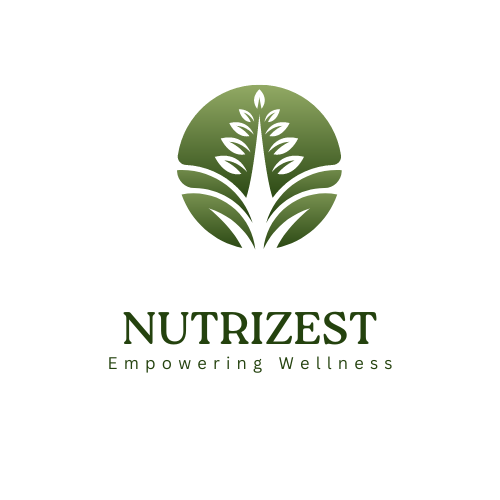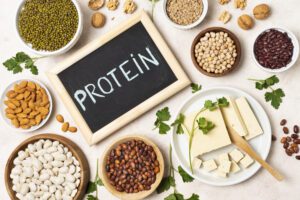Protein is one of the most essential nutrients for our body, playing a crucial role in building and repairing tissues, producing enzymes and hormones, and supporting overall health. In this comprehensive blog, we’ll explore what protein is, why it’s important, how much you need, and the best sources to include in your diet.
What is Protein?
Proteins are large, complex molecules made up of amino acids, which are organic compounds composed of carbon, hydrogen, nitrogen, oxygen, and sulphur
There are 20 different amino acids that combine in various ways to form proteins. Of these, nine are considered essential amino acids because the body cannot produce them, and they must be obtained through diet.
Why is Protein Important?
- Building and Repairing Tissues: Proteins are fundamental building blocks of muscles, bones, skin, and blood. They play a vital role in repairing tissues, making them crucial for recovery from injury and exercise.
- Enzyme Production: Enzymes are proteins that catalyse biochemical reactions in the body, including digestion, energy production, and muscle contraction.
- Hormonal Balance: Some hormones are proteins, such as insulin, which regulates blood sugar levels, and growth hormone, which is essential for growth and development.
- Immune Function: Proteins are necessary for the production of antibodies that fight infections and illnesses.
- Energy Source: While carbohydrates and fats are the body’s preferred energy sources, protein can also be used for energy when these are in short supply.
How Much Protein Do You Need?
The amount of protein you need can vary based on factors such as age, sex, weight, and activity level. However, general guidelines include:
- Sedentary Adults: Approximately 0.8 grams of protein per kilogram of body weight.
- Active Adults: 1.0-1.2 grams per kilogram of body weight.
- Athletes and Bodybuilders: 1.2-2.0 grams per kilogram of body weight.
- Elderly Individuals: Slightly higher than the general adult recommendation to help preserve muscle mass and strength.
For example, a sedentary woman weighing 60 kg (132 lbs) would need about 48 grams of protein per day, while an active man weighing 80 kg (176 lbs) might need between 80 to 96 grams per day.
Best Sources of Protein
Animal-Based Sources:
- Meat: Beef, pork, lamb, and poultry are excellent sources of high-quality protein.
- Fish and Seafood: Salmon, tuna, shrimp, and other seafood are rich in protein and also provide healthy fats like omega-3 fatty acids.
- Dairy Products: Milk, cheese, yogurt, and other dairy products offer not only protein but also calcium and other essential nutrients.
- Eggs: A versatile and affordable source of protein, eggs also contain vitamins and minerals.
Plant-Based Sources:
- Legumes: Beans, lentils, chickpeas, and peas are great sources of protein, fiber, and other nutrients.
- Nuts and Seeds: Almonds, walnuts, chia seeds, flaxseeds, and hemp seeds provide protein along with healthy fats.
- Tofu and Tempeh: Made from soybeans, these are excellent meat substitutes high in protein.
- Quinoa and Whole Grains: Quinoa, brown rice, barley, and oats contain protein and are rich in other essential nutrients.
Combining Protein Sources
For vegetarians and vegans, combining different plant-based protein sources can ensure they get all the essential amino acids. Examples include:
- Rice and Beans: Together, they provide a complete amino acid profile.
- Hummus and Pita: Chickpeas and whole grains combine to offer a balanced protein source.
- Lentil Soup with Whole Grain Bread: This combination ensures a variety of amino acids.
Potential Risks of High-Protein Diets
While protein is essential, excessive intake can lead to health issues such as:
- Kidney Damage: Overworking the kidneys in people with pre-existing conditions.
- Dehydration: High protein intake can increase the need for water to flush out by-products.
- Nutrient Deficiency: Overemphasis on protein might lead to insufficient intake of other essential nutrients like fiber, vitamins, and minerals.
Types of Protein Supplements:
- Whey Protein:
- Derived from milk during the cheese-making process.
- Fast-digesting and rich in essential amino acids, particularly leucine, which is important for muscle protein synthesis.
- Casein Protein:
- Also derived from milk but digested more slowly than whey.
- Provides a steady release of amino acids over time, making it suitable for prolonged periods without food (e.g., before bed).
- Soy Protein:
- Plant-based protein source suitable for vegetarians and vegans.
- Contains all essential amino acids and is often considered a complete protein.
- Pea Protein:
- Another plant-based option, ideal for those with dairy or soy allergies.
- Rich in branched-chain amino acids (BCAAs) that support muscle recovery and growth.
- Hemp Protein:
- Derived from hemp seeds, this protein source is high in fiber and contains omega-3 fatty acids.
- Provides a complete protein profile and is easily digestible.
Benefits of Protein Supplements:
- Muscle Growth and Repair:
- Protein is essential for building and repairing muscle tissue, making protein supplements popular among athletes and those engaged in strength training.
- Convenience:
- Protein supplements offer a quick and convenient way to increase protein intake, especially for individuals with busy lifestyles or dietary restrictions.
- Weight Management:
- Protein is known to promote satiety, helping to curb cravings and support weight loss or maintenance goals.
- Improved Recovery:
- Consuming protein supplements post-exercise can aid in muscle recovery, reduce soreness, and enhance overall exercise performance.
Considerations and Tips:
- Quality Matters:
- Choose high-quality protein supplements from reputable brands to ensure purity and effectiveness.
- Dosage:
- The recommended protein intake varies based on individual factors such as age, activity level, and goals. Consult a healthcare professional or nutritionist for personalized guidance.
- Timing:
- Consuming protein supplements around workouts (pre- and post-exercise) can maximize their benefits for muscle growth and recovery.
- Whole Foods First:
- While protein supplements can be beneficial, prioritize getting protein from whole food sources such as lean meats, fish, eggs, legumes, and dairy products as part of a balanced diet.
- Hydration:
- Ensure adequate hydration when consuming protein supplements, as they may increase your body’s water needs.
Protein supplements can be a valuable addition to a healthy lifestyle when used appropriately and in conjunction with a well-rounded diet and regular exercise regimen.
Conclusion
Protein is indispensable for maintaining and building our body’s structure and function. By understanding its importance, determining the right amount for your needs, and choosing high-quality sources, you can optimize your health and well-being. Whether through animal products or plant-based foods, there are plenty of delicious and nutritious ways to ensure you’re getting enough protein in your diet. Remember to balance your protein intake with other essential nutrients for a well-rounded and healthy diet.


Thank you for this informative blog , keep spreading and sharing your knowledge with us , would like to read more !